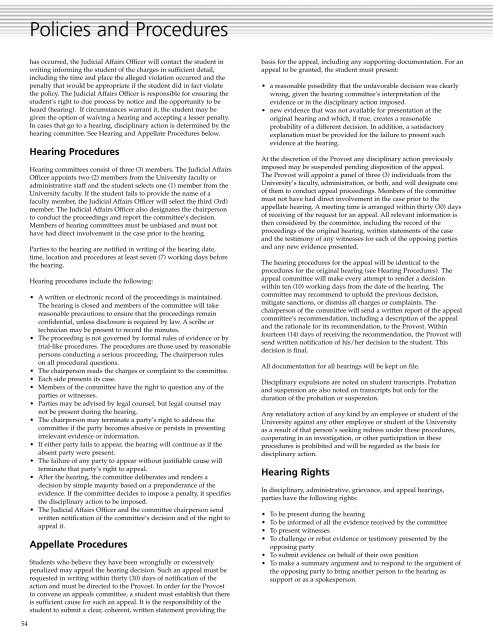Catalog 73 - National University
Catalog 73 - National University
Catalog 73 - National University
- No tags were found...
You also want an ePaper? Increase the reach of your titles
YUMPU automatically turns print PDFs into web optimized ePapers that Google loves.
Policies and Procedureshas occurred, the Judicial Affairs Officer will contact the student inwriting informing the student of the charges in sufficient detail,including the time and place the alleged violation occurred and thepenalty that would be appropriate if the student did in fact violatethe policy. The Judicial Affairs Officer is responsible for ensuring thestudent’s right to due process by notice and the opportunity to beheard (hearing). If circumstances warrant it, the student may begiven the option of waiving a hearing and accepting a lesser penalty.In cases that go to a hearing, disciplinary action is determined by thehearing committee. See Hearing and Appellate Procedures below.Hearing ProceduresHearing committees consist of three (3) members. The Judicial AffairsOfficer appoints two (2) members from the <strong>University</strong> faculty oradministrative staff and the student selects one (1) member from the<strong>University</strong> faculty. If the student fails to provide the name of afaculty member, the Judicial Affairs Officer will select the third (3rd)member. The Judicial Affairs Officer also designates the chairpersonto conduct the proceedings and report the committee’s decision.Members of hearing committees must be unbiased and must nothave had direct involvement in the case prior to the hearing.Parties to the hearing are notified in writing of the hearing date,time, location and procedures at least seven (7) working days beforethe hearing.Hearing procedures include the following:• A written or electronic record of the proceedings is maintained.The hearing is closed and members of the committee will takereasonable precautions to ensure that the proceedings remainconfidential, unless disclosure is required by law. A scribe ortechnician may be present to record the minutes.• The proceeding is not governed by formal rules of evidence or bytrial-like procedures. The procedures are those used by reasonablepersons conducting a serious proceeding. The chairperson ruleson all procedural questions.• The chairperson reads the charges or complaint to the committee.• Each side presents its case.• Members of the committee have the right to question any of theparties or witnesses.• Parties may be advised by legal counsel, but legal counsel maynot be present during the hearing.• The chairperson may terminate a party’s right to address thecommittee if the party becomes abusive or persists in presentingirrelevant evidence or information.• If either party fails to appear, the hearing will continue as if theabsent party were present.• The failure of any party to appear without justifiable cause willterminate that party’s right to appeal.• After the hearing, the committee deliberates and renders adecision by simple majority based on a preponderance of theevidence. If the committee decides to impose a penalty, it specifiesthe disciplinary action to be imposed.• The Judicial Affairs Officer and the committee chairperson sendwritten notification of the committee’s decision and of the right toappeal it.Appellate ProceduresStudents who believe they have been wrongfully or excessivelypenalized may appeal the hearing decision. Such an appeal must berequested in writing within thirty (30) days of notification of theaction and must be directed to the Provost. In order for the Provostto convene an appeals committee, a student must establish that thereis sufficient cause for such an appeal. It is the responsibility of thestudent to submit a clear, coherent, written statement providing thebasis for the appeal, including any supporting documentation. For anappeal to be granted, the student must present:• a reasonable possibility that the unfavorable decision was clearlywrong, given the hearing committee’s interpretation of theevidence or in the disciplinary action imposed.• new evidence that was not available for presentation at theoriginal hearing and which, if true, creates a reasonableprobability of a different decision. In addition, a satisfactoryexplanation must be provided for the failure to present suchevidence at the hearing.At the discretion of the Provost any disciplinary action previouslyimposed may be suspended pending disposition of the appeal.The Provost will appoint a panel of three (3) individuals from the<strong>University</strong>’s faculty, administration, or both, and will designate oneof them to conduct appeal proceedings. Members of the committeemust not have had direct involvement in the case prior to theappellate hearing. A meeting time is arranged within thirty (30) daysof receiving of the request for an appeal. All relevant information isthen considered by the committee, including the record of theproceedings of the original hearing, written statements of the caseand the testimony of any witnesses for each of the opposing partiesand any new evidence presented.The hearing procedures for the appeal will be identical to theprocedures for the original hearing (see Hearing Procedures). Theappeal committee will make every attempt to render a decisionwithin ten (10) working days from the date of the hearing. Thecommittee may recommend to uphold the previous decision,mitigate sanctions, or dismiss all charges or complaints. Thechairperson of the committee will send a written report of the appealcommittee’s recommendation, including a description of the appealand the rationale for its recommendation, to the Provost. Withinfourteen (14) days of receiving the recommendation, the Provost willsend written notification of his/her decision to the student. Thisdecision is final.All documentation for all hearings will be kept on file.Disciplinary expulsions are noted on student transcripts. Probationand suspension are also noted on transcripts but only for theduration of the probation or suspension.Any retaliatory action of any kind by an employee or student of the<strong>University</strong> against any other employee or student of the <strong>University</strong>as a result of that person’s seeking redress under these procedures,cooperating in an investigation, or other participation in theseprocedures is prohibited and will be regarded as the basis fordisciplinary action.Hearing RightsIn disciplinary, administrative, grievance, and appeal hearings,parties have the following rights:• To be present during the hearing• To be informed of all the evidence received by the committee• To present witnesses• To challenge or rebut evidence or testimony presented by theopposing party• To submit evidence on behalf of their own position• To make a summary argument and to respond to the argument ofthe opposing party to bring another person to the hearing assupport or as a spokesperson.54
















